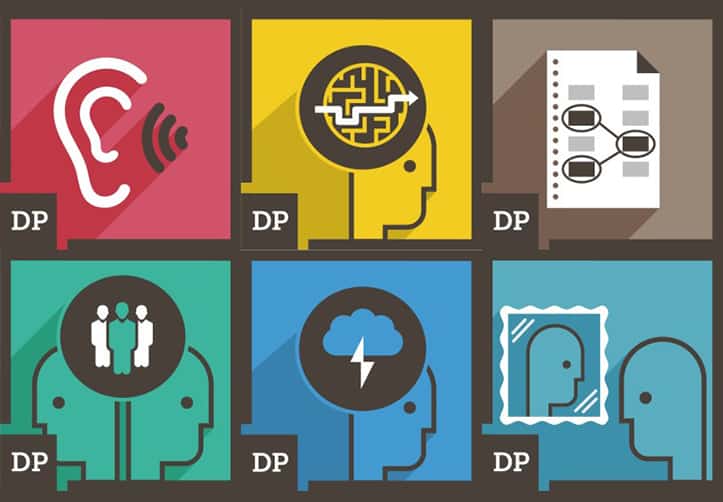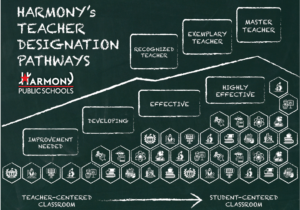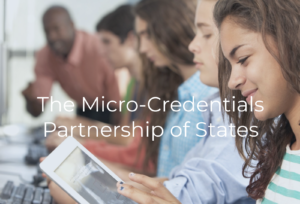Building Micro-credential Momentum

Dr. Brent Maddin, Relay GSE Provost, notes two scenarios:
- A principal hiring a new teacher. Beyond scanning candidates’ resumes and extrapolating effectiveness from one interview and sample lesson, how can a principal quickly and confidently identify those candidates best prepared to lead their students to success? Or fill a specific need on the faculty?
- An academic dean observing two teachers at his school with markedly different performance, and consequently very different professional development needs. How can this dean more effectively personalize professional development to meet each teacher where they are and help them get to where they need to be?
These examples highlight limitations of today’s “seat-time” models of teacher professional development. Maddin, a member of the Digital Promise Micro-credential Advisory Board, imagines a “world where educators may be immediately and widely recognized for specific knowledge, skills, and mindsets that they demonstrate in transparent, competency-based ways.”
As explained in a new paper, micro-credentials are a digital form of certification that indicate when a person has demonstrated competence in a specific skill set. As a progress tracking and signaling system, micro-credentials are gaining traction in education since they offer a promising approach to personalized, competency-based professional learning.
“By validating educators’ skills through self-curated and assessed evidence, micro-credentials would not only complement today’s systems of certifications, but could create new proficiency-based specializations,” said Maddin.
Relay has created 14 micro-credentials: 10 on data literacy, and another four related to the critical educator skill of checking for understanding.
National nonprofit Digital Promise is the leader in shaping the micro-credential movement. In this podcast, Jennifer Kabaker, Director of Educator Micro-Credentials, and platform partner BloomBoard CEO Jason Lange describe the future of educator development.
“Over the past two years,” explained Kabaker, “Digital Promise has been building an ecosystem of micro-credentials to provide competency-based recognition for the skills educators develop throughout their careers in both formal and informal contexts. Supported by the Open Badge Standard developed by Mozilla and digital badging technology, these micro-credentials provide educators with concrete validation of their learning that can be used as a type of currency in professional learning.”
With more than 15 partner organizations with specific content or pedagogical expertise, Digital Promise has published more than 120 micro-credentials on a variety of topics, such as deeper learning, teacher leadership, and data literacy.
Maddin said they’ve learned three lessons about developing micro-credentials:
- We need to support anywhere, anytime learning. Recognizing that learning happens anywhere, micro-credentials must focus on competencies rather than units of instruction.
- We need to design for educators, not just teachers. Micro-credentials are also relevant for administrators, librarians, coaches, tech leads, and beyond.
- We need to balance authenticity of evidence with what might be required gather and assess that evidence.Ideally, educators would submit evidence of micro-credential mastery that came directly from their practice but sometimes that’s just not practical and other forms of evidence must be considered–a transcript rather than a video, for example or even a virtual reality simulator (check out the cool work from TeachLivE using this type of technology).
Building Demand
Now that a growing number of organizations are creating and offering micro-credentials, the new challenge is to make them more valuable to educators by increasing the number of states, districts, and networks that recognize them as signals of professional growth.
Digital Promise is approaching this challenge from multiple angles. Jennifer Kabaker said the first approach is to become a provider of continuing education units (CEU) in states where that is possible so that educators who earn micro-credentials will be able to receive credit for them regardless of whether their districts are formally participating in micro-credentials. So far, this is possible in Illinois, Texas, and North Carolina.
Building demand for micro-credentials starts with supporting schools and districts in providing educators with micro-credential opportunities. This could be CEUs in districts that have approval rights, incorporating micro-credentials into other professional learning structures such as professional growth plans or professional learning communities (PLC), or incorporating them into compensation (e.g., Wisconsin’s Kettle Moraine School District provides teachers who earn micro-credentials with $200 base pay increases). “This has had great traction with our League of Innovative Schools districts and we are starting pilots now,” said Kabaker.
Houston Independent School District is working with the University of San Diego to develop micro-credentials aligned with their new “Global Graduates” priorities to provide educators with competency-based opportunities to grow their skills.
Another opportunity is working directly with states to pilot micro-credential implementation plans to provide teachers with recognition through CEUs or other professional development structures like professional growth plans. Maine is first state to partner with Digital Promise to offer micro-credentials to teachers.
The opportunities to provide educators with value for micro-credentials does not end at traditional K-12 structures. For example, HigherEd providers could offer credit for earned micro-credentials. Digital Promise already has higher education partnerships with ASU, Relay, UCF, and USD, paving the way for these possibilities.
In addition to financial incentives, schools are incorporating micro-credentials into weekly PLC meetings. “Educators can select a micro-credential that meets the goals of their PLC and support each other as they embark on learning a new skill and collecting the necessary evidence,” explains Kabaker.
Helping students benefit from blended, personalized, and competency-based learning starts with providing the same kinds of learning experiences for educators.
For more on Micro-credentials, check out:
Stay in-the-know with all things EdTech and innovations in learning by signing up to receive the weekly Smart Update.








0 Comments
Leave a Comment
Your email address will not be published. All fields are required.